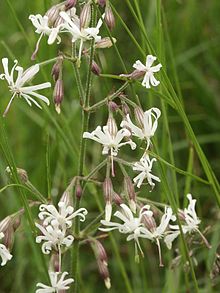Silene nutans
| Silene nutans | |
|---|---|
 |
|
| Scientific classification | |
| Kingdom: | Plantae |
| (unranked): | Angiosperms |
| (unranked): | Eudicots |
| (unranked): | Core eudicots |
| Order: | Caryophyllales |
| Family: | Caryophyllaceae |
| Genus: | Silene |
| Species: | S. nutans |
| Binomial name | |
|
Silene nutans L. |
|
| Synonyms | |
|
|
| External identifiers for Silene nutans | |
|---|---|
| Encyclopedia of Life | 593152 |
| ITIS | 20095 |
| NCBI | 42038 |
Silene nutans is a flowering plant in the genus Silene, most commonly known as Nottingham catchfly.
Silene nutans is a diploid, mainly outcrossing, herbaceous, perennial plant. It grows up to 25–80 centimetres (10–31 in) tall, from a branching, woody stock with a thick taproot. The lower leaves are up to 75 millimetres (3 in) long, and have a long stalk, while leaves higher on the plant are , and acute; all the leaves are covered in soft hairs. The flowers are 18 millimetres (0.7 in) wide, 12 millimetres (0.5 in) long, and drooping, on short, stalks. The petals are white or pinkish and divided into two narrow lobes. Each flower remains open for three nights as a means of preventing self-fertilisation; the flower reveals one whorl of stamens on the first night, the second whorl of stamens on the second night, and the three styles on the third night. The seeds are 10–22 millimetres (0.4–0.9 in) wide and kidney-shaped.
Silene nutans is widespread across Europe, from southern Spain and Italy north to the British Isles and Scandinavia, and is also found across large parts of Asia. It has been introduced to North America, where it is known as the Eurasian catchfly. It is found in the U.S. states of Michigan, Ohio, New York, Vermont and Maine.
Silene nutans can sometimes be found in the very widespread MG1 (Arrhenatherum elatius grassland) community of the British National Vegetation Classification, and thus can be found where Arrhenatherum elatius (false oat grass) or Dactylis glomerata (cocksfoot) occur.
...
Wikipedia
